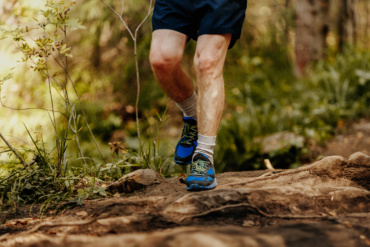You bent down, stood up too fast, went for a run—or maybe you were just sitting for hours. Then it hits: that nagging or sharp pain in the back of your thigh. For some, it feels like a deep cramp. For others, it’s more of a burn, or even numbness. Either way, you’re left wondering: is this a hamstring strain, sciatica, or something worse?
Here at Pyramid PT in San Antonio, TX, we see this kind of pain all the time—and it’s rarely just a simple injury. The back of the thigh is a complex area, and getting to the root cause is key to actually fixing the issue, not just covering it up.
Understanding the Back of the Thigh: More Than Just Hamstrings
The posterior thigh is home to major players in your movement chain. That includes:
-
Hamstring muscles (biceps femoris, semitendinosus, semimembranosus)
-
Sciatic nerve, the longest nerve in your body
-
Fascial tissue, connective tissue that impacts flexibility and function
These systems all work together when you walk, sit, stand, or move. So when there’s pain, it could be coming from muscles, nerves, or even how your pelvis or lower back is functioning. That’s why understanding the source is the first step in actually resolving it.
Common Causes of Pain in the Back of the Thigh
1. Hamstring Strain or Tear
Whether from sprinting, jumping, or sudden stretching, hamstring injuries are one of the most common culprits. Symptoms usually include:
-
Sharp pain during activity
-
Tenderness or bruising
-
Weakness or stiffness
These can range from mild overstretching to full-thickness muscle tears.
2. Sciatic Nerve Irritation (Sciatica)
When the sciatic nerve gets compressed or irritated—often due to a herniated disc, tight piriformis muscle, or poor posture—you may feel:
-
Burning or tingling down the back of the thigh
-
Pain that radiates into the calf or foot
-
Numbness or weakness in the leg
This is one of those conditions people tend to misdiagnose as a “pulled hamstring.”
3. Referred Pain from the Lower Back
Degenerative disc disease, spinal stenosis, or SI joint dysfunction can refer pain into the back of the thigh. The key here? The problem may not actually be in your leg.
4. Ischial Bursitis
This inflammation of the bursa (a fluid-filled sac) near your “sit bone” causes pain especially after prolonged sitting or direct pressure. Athletes and cyclists often deal with this.
5. Poor Posture & Prolonged Sitting
Sitting for long periods shortens the hip flexors and puts tension on the posterior chain, leading to weakness, tightness, and even nerve entrapment symptoms.
Diagnosis: Don’t Just Google It—Get the Right Answer
When you’re dealing with persistent or recurring back-of-thigh pain, you need more than a quick stretch or a guess.
Self-Assessment Red Flags
Ask yourself:
-
Does the pain shoot below the knee?
-
Does it get worse when sitting or first thing in the morning?
-
Is it sharp and sudden, or dull and achy?
-
Do you feel tingling, numbness, or weakness?
If the answer is yes to any of these, it’s time to get evaluated professionally.
What We Do at Pyramid PT
At Pyramid PT in San Antonio, we use:
-
Movement assessments to spot muscular imbalances
-
Palpation and neural tension testing to identify nerve involvement
-
Joint mobility checks in the hips, pelvis, and spine
-
Postural analysis to understand root causes, not just symptoms
We’re not just looking at your thigh—we’re looking at the whole kinetic chain that’s feeding into your pain.
Treatment Options: Getting You Back to Moving—Pain-Free
Once we know what’s really going on, treatment becomes specific, targeted, and effective.
Physical Therapy for Posterior Thigh Pain
Here’s how we typically help clients find relief at Pyramid PT:
-
Manual Therapy
Soft tissue release, trigger point therapy, and nerve mobilization help restore normal movement and relieve pressure. -
Targeted Exercise Program
We build a custom program around your unique imbalances—strengthening glutes, hamstrings, and deep core muscles. -
Neuromuscular Re-education
Often the way your brain controls movement needs a reset. We’ll help retrain those patterns. -
Posture and Movement Correction
From how you sit at your desk to how you climb stairs—we coach you to move better all day, not just in the clinic. -
Pain Modulation
We use modalities like dry needling or electrical stimulation (if appropriate) to reduce pain and inflammation, speeding up your progress.
Prevention: How to Keep That Thigh Pain from Coming Back
Here’s the thing—pain relief is just step one. You also need to build resilience to prevent this from becoming a recurring issue.
A Few Key Prevention Tips:
-
Stretch regularly, especially your hamstrings, calves, and hip flexors
-
Strengthen the posterior chain, including glutes and hamstrings
-
Avoid slouching, especially when working or driving
-
Incorporate mobility drills into your daily routine
-
Warm up properly before workouts (this is non-negotiable)
If you’re unsure how to structure this, we’ll guide you through a long-term plan during your sessions at Pyramid PT. We’re all about education + execution.
Let’s Put a Stop to That Thigh Pain—Starting Now
Look, pain in the back of your thigh doesn’t just make life harder—it slows you down in everything you do. Whether it’s a nagging ache that’s been hanging around or a sharp pull you just felt during a workout, this is your sign to stop guessing and start healing.
At Pyramid PT in San Antonio, TX, we specialize in finding the real reason behind your pain—and building a plan that actually works. Our team has helped hundreds of people move better, feel stronger, and ditch the ice packs and pain meds.
If you’re ready for a real answer and long-term relief, book your personalized evaluation with us today. We’ll walk you through every step, from diagnosis to full recovery—and make sure you feel confident in your body again.


